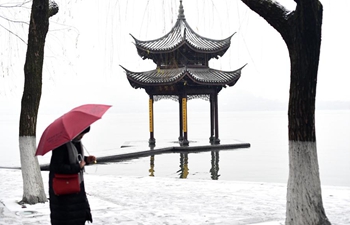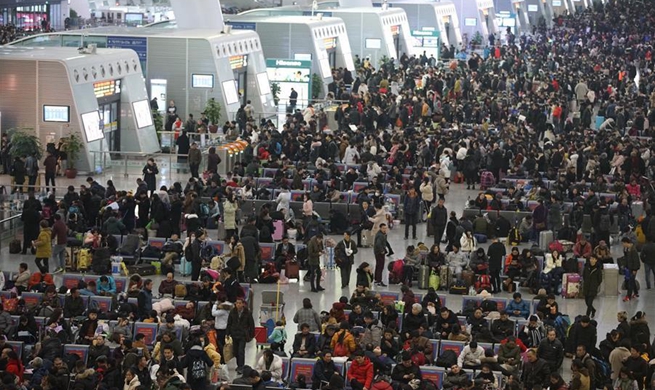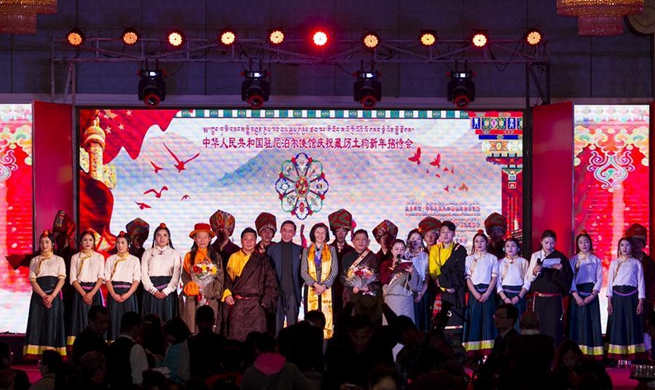TOKYO, Jan. 26 (Xinhua) -- Japan's core consumer prices increased 0.9 percent in December from a year earlier, the government said in a report on Friday, with the sluggish pace of price increases continuing to impede the central bank's efforts to comprehensively escape deflation.
According to the Ministry of Internal Affairs and Communications, the core consumer price index, excluding fresh food prices due to their volatility, increased for the 12th consecutive month, on the heels of a 0.9 percent rise logged a month earlier.
The index, however, still remained a long way below the Bank of Japan's (BOJ) 2 percent inflation target.
Booking a positive reading for the first time in two years, the CPI for 2017 increased 0.5 percent, the ministry also said, compared with a drop of 0.3 percent in 2016.
Owing to a rise in import costs for crude oil, electricity and gasoline prices increased in the recording year, the ministry said, with such energy-related items in particular being the predominant force behind core CPI gains.
Gains in the year were pared, however, by increasing price competition between mobile phone carriers, the statistics bureau said.
The government's data also showed that when excluding fresh food and energy prices for their volatility, "core-core" consumer prices increased just 0.1 percent in 2017, compared to a 0.6 percent rise logged for the previous year.
As for CPI for Tokyo's 23 wards, the data set of which is released a month before nationwide data and seen as a gauge of wider price moves. The index gained 0.7 percent in January from a year earlier, following a 0.8 percent rise logged a month earlier, the government said.
The central bank here has unrolled a number of aggressive monetary easing measures in a bid to overcome decades of deflationary pressure in Japan and the government is urging companies to increase wages in a bid to spur consumer spending.
Despite an on-year rise in wholesale prices, however, the BOJ is still struggling to convert the effects into a significant rise in inflation.
The BOJ announced Tuesday it would maintain its aggressive monetary easing policy as it continues to grapple to achieve its lofty 2 percent inflation target with the bank conceding inflation is just above zero despite a moderate economic expansion.
"Japan's economy is expanding moderately but inflation remains weak," BOJ Governor Haruhiko Kuroda told a press conference after the conclusion of the central bank's two-day policy board meeting.
"Other countries are facing similar situations but unlike these countries, many of whom are seeing inflation move around 1.5 percent, inflation, excluding energy costs, is barely above zero percent in Japan," Kuroda said
"There is still some distance to 2 percent inflation, so we're in no condition yet to debate the timing of an exit from ultra-easy monetary policy," added Kuroda.
This is due to business and household confidence which remains low, with companies concerned that hiking their prices with repel consumers and adversely hit their bottom lines.
Households, meanwhile, have continued to tighten their purse strings amid a murky outlook for income and expenditure, with a planned consumption tax hike likely to exacerbate households' thriftiness as Japan's "deflationary mindset" becomes increasingly ingrained.
Following consumption tax hikes from 3 to 5 percent in 1997 and from 5 to 8 percent in 2014, while consumption spiked before the levies were increased, on both occasions the economy ended up in recession as a result of the hike.
The government, knowing the economy would wobble and likely be plunged into recession again, has pushed back the timing of the next tax hike, from 8 percent to 10 percent, from October 2015 to April 2017 and then to October 2019, leading economists here pointed out, while urging companies to increase wages to fortify households' income and spur spending.
Earlier this month, Japan's most powerful business lobby, known here as Keidanren, urged its member companies to implement a 3 percent pay hike as part of its overall guidelines for 2018 spring wage negotiations, which kicked off this week.
Substantiating economists' views of continued deflationary pressure in Japan, Keidanren called for pay hikes not just through scaled increases, but also through bonuses and other incentives in a bid to stimulate consumption and to "contribute to Japan's full exit from deflation" and further expansion of a virtuous cycle in the country's economy.
Japan's CPI is a measure estimating the average price of consumer goods and services purchased by households here.
The consumer price index in Japan measures a price change for a constant market basket of goods and services from one period to the next here within the same area or city.
The index is determined by measuring the price of a standard group of goods meant to represent the typical "market basket" of a typical urban consumer.
The percent change in the CPI is a measure estimating inflation.

















